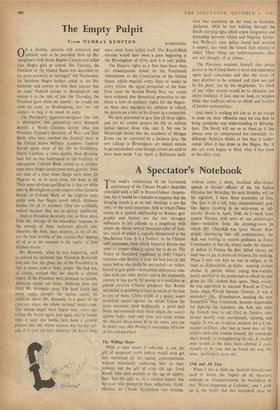The Willing Horse What a man wants, I reflected, is
not the gift of perpetual youth (which would soon get him ostracised by his ageing contemporaries without necessarily endearing him to their juniors), but the gift of crisp old age. Lord Brand, who died recently at the age of eighty-, four, had this gift; so, in a marked degree, has the man who prompted these reflections. Field- Marshal Sir Claude Auchinleck was making, without notes, a short, excellent hfter-dinncr speech to former officers of the 5th Indian Division last Saturday; his next birthday will be his eightieth. I have three memories of him. The first is of a tall, trim, unintentionally god- like figure standing in an ante-room at Ad- miralty House in April, 1940. As I—back from central Norway with news of our misfortunes there—withdrew from the dressing-room in which Mr. Churchill was (pace Master Ran- dolph) clambering into silk combinations, the Auk was waiting to receive guidance as Force Commander at Narvik, where under the shadow of defeat in France the first Allied victory on land was to go, in terms a reclaim, for nothing. When I next saw him he was in eclipse, or at least en disponibilite, in India : wearing civilian clothes at parties where young box-wallahs, newly enrolled in the profession to which he had given his life, clinked their spurs. Then, wisely, he was appointed to succeed Wavell as C-in-C India when Wavell became Viceroy. It was a secondary role. Mountbatten, heading the new South-East Asia Command, became responsible for fighting the Japanese; the Auk was what the French used to call Chef de rarriP,re, con- cerned mainly with recruitment, training and supply. It was an invidious position for a Com- mander-in-Chief, who had to hand over all his army's teeth and confine himself, for somebody else's benefit, to strengthening ifs tail. A smaller man would, at the least, have allowed it o1/4:ca- sionally to be seen that he found the task irk- some. Auchinleck never did.










































 Previous page
Previous page